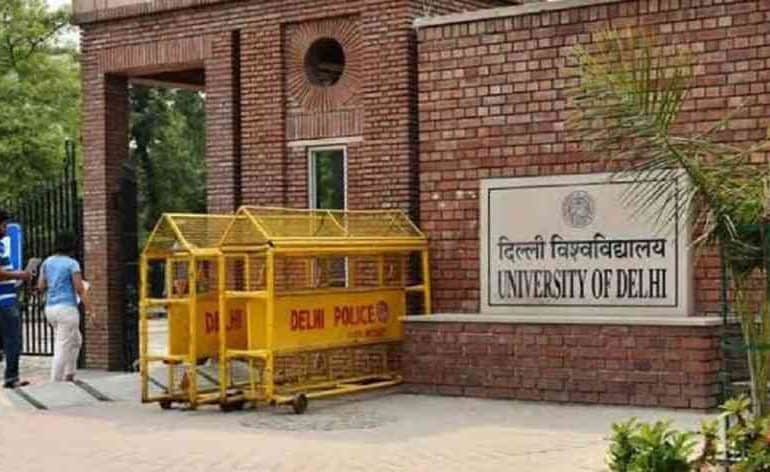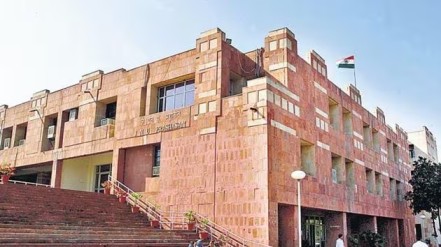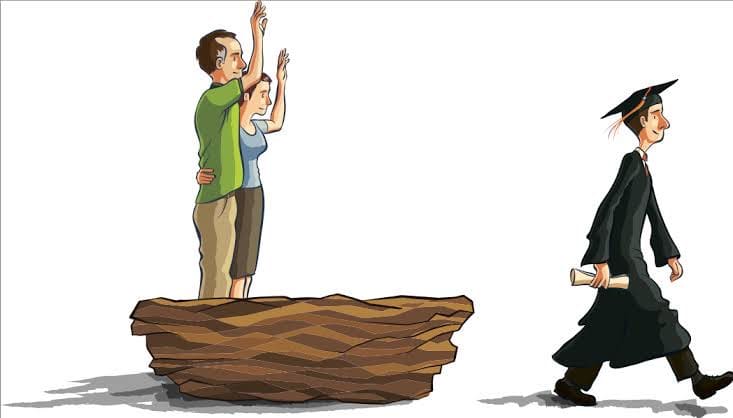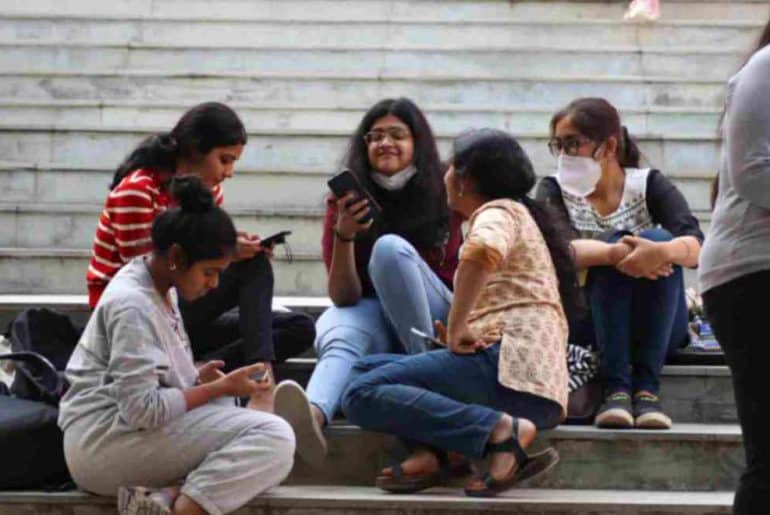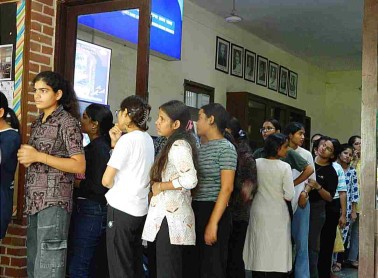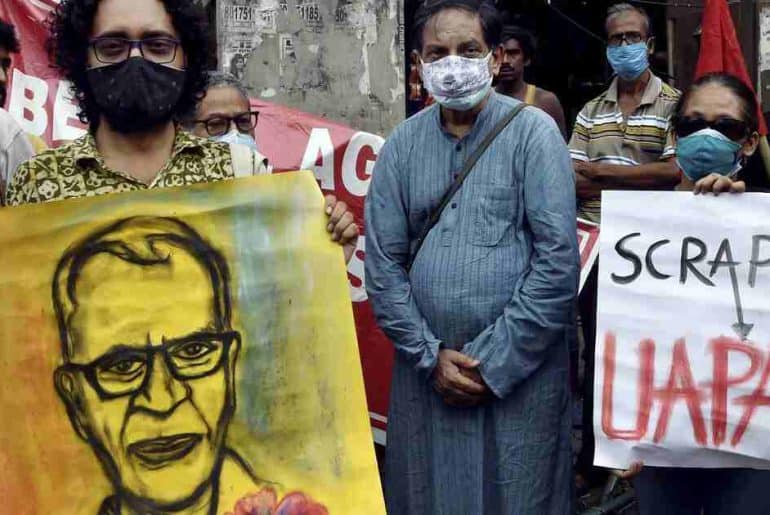Bidding farewell to college is like bidding farewell to a sense of stillness amidst the chaos in your life. What’s even more difficult is sometimes bidding farewell to the societies within these spaces, which is perhaps way more difficult for the juniors left behind.
Disclaimer: Readers might be left with a bittersweet feeling in their heart and might shed a tear or two, so proceed with caution.
Dear Reader,
As we close a chapter on the batch of 2024, turning the page on perhaps the most personal part of our college lives – our societies – might be even more painful. As an anxious, scared, and confused college student, the author found comfort and solace in one such society, and as a second-year student, she finds it even harder to say goodbye to the senior who made college feel like home. Friends’ Corner, the Mental Health and Counselling Cell of Hindu College, became a warm cup of chai during the rain for this author, and its president, Suangouding Guite, became the rainbow after the rain. Some might say his infectious smile, quirky one-liners, and him saying “period” after every sentence just helped them feel comfortable and safe in an otherwise overwhelming college space.
You know when you’re anticipating that your drink might be too hot or too cold, but when you take a sip, it’s the perfect temperature. This happiness, satiety, and comfort were what I got when I first interacted with Gouding. He, along with our seniors Soham and Varnika, made an amateur at society work like me, feel appreciated, and feel at home, and this society soon became my comfort space.” – says Vidita Verma, a second-year English Literature student at Hindu College.
In conversation with DU Beat, Gouding, a third-year sociology student and the president of Friends’ Corner, shared his experience at FC and how bidding farewell to this space feels personal.
For me, bidding farewell to Friends’ Corner is more like closing a chapter on my life, to the important and beautiful people and memories that make FC, as it became a part of me in these past three years, which I don’t want to let go of. I want FC to be known for its safe space, open conversations, and belongingness, which allow others to be vulnerable, and I hope I was able to create that legacy. This space became synonymous with Hindu for me, and this goodbye just feels personal. It was a society I joined for its safe space and open conversations about mental health, as it won’t really fetch you any CV points, and I stayed because it allowed me to be whatever I wanted to be and to feel whatever I wanted to feel, as it exists for others to grow and for them to learn from.” – Suangouding, president of Friends’ Corner, reflected.
We’ve all had our fair share of uplifting and disappointing moments, intertwined with promises that sometimes fall short but are cloaked in sweetness. College societies have brought us together in unexpected ways, fostering beautiful connections for some and challenging experiences for others. The author did find herself in a pickle while writing this piece as she has been a part of the healthier and less emotionally daunting side of college societies, or rather has been quite lucky with the people, particularly the seniors she met, but a student from South Campus College who wished to remain anonymous remarked about its dramatics society.
I happened to have worked with seniors who would rather throw you under the bus for the sake of asserting their dominance. Favouritism, selective targeting, and insensitive manipulative behaviour, are some of the qualities they’d be passing onto their juniors. My seniors honestly sucked, and I’m more than happy to be bidding them farewell.” – they reflected.
Performing Arts societies in DU might be known for their (valuable) experience, hectic schedules, overwhelming work, and hierarchies, but despite their generalised perception, they do end up becoming free and homely spaces for students, and we might meet seniors who make it just that.
In conversation with DU Beat, Manya Mallika, a third-year Physics student from Hindu College, opened up about her fruitful tenure at Masque, the English Theatre Society, not just as its co-director but as a first-year student who joined the society through online inductions during the lockdown.
After coming to Delhi after an online semester, the only people aware of my presence were in Masque, which initially seemed like just another college club. Despite finding other ways to engage in theatre, Masque somehow provided me with an identity in college, where I could be myself, through its lack of hierarchy and uniting people through their love for theatre rather than fear. I stayed because I felt a sense of belonging, and some friendships just stayed. My biggest realisation here is that human beings are prone to making mistakes; we are all flawed in some way. College should be a time of exploration, learning, and growth, and being patient and kind to others and ourselves. Remind ourselves to take a deep breath, as we’re all going to die anyway.” – Manya discussed.
An anonymous first-year student from Hindu College, in conversation with DU Beat, bid a heartwarming farewell to their senior at Aria, the Western Music Society.
Priyansha (Yuhu) is a special person, not just for me but for the entire Acapella team of Aria. While being a great leader with her management and communication skills, she is a softie who cracks quirky jokes with her nasal voice, lighting up the mood of the entire team whenever we lose a competition (and that’s every time, lol). She built a family within a society, and while I wish her well for her dazzling future, bidding her farewell feels bittersweet as it’ll be very difficult to fill the void left behind by our very own Yuhu.” – they remarked.
Anvesha Tripathi, a second-year Economics student at IPCW, shares how La Cadenza, the Western Music Society, ended up being the biggest and most exciting part of her college life, mostly owing to the seniors that she found there.
My seniors at Cadenza were nothing short of supportive, understanding, kind, and so unabashedly funny that every doubt vanished the second I walked into the practice room and helped us navigate this crazy circuit. One senior in particular stands out though: Ashna Dongre, who is a vision to look at and an absolute honour to be around. Every second I spend with her is enriching and leaves me either smiling or laughing my guts out. She is an absolute breath of fresh air on dreary days. I have sought in her love, support, and a simple shoulder to share my burdens with, and practice without her will feel incomplete, and so will the rest of my time at college.” – Anvesha said.
It is said that first-year students enter DU with dreams in their eyes and passion in their hearts. Amidst the pool of batchmates, unspoken bonds, and sometimes fragile friendships, a lot of us struggle to strike a bond with any of our seniors in our respective departments. But lucky are the ones who end up discovering that friendship, solace, and guidance in that one senior in a society. An anonymous first-year student found such comfort in a senior at Vivre, the Film and Photography Society of Hindu College.
I learned a lot from them, and it’s definitely hitting me now that I have to bid farewell to them. It’s going to get hard for me because I don’t have a lot of friends or people I hold close to my heart in the second year. There’s one senior in particular, who I’m perhaps the closest to in the entire college. This is my person, and I hold them very close to my heart. Saying goodbye to them is going to break my heart, and I don’t want to think about it. What makes it sadder is that they are also leaving Delhi, so I might not see them ever.” – the student commented.
S. Bangshing Panja, a third-year philosophy student at Hindu College, shares how bidding farewell to his college and his society might be hard, but it’s time for him to make space for others.
Although societies haven’t become synonymous with Hindu, there’s definitely a bittersweet feeling in my heart while waving goodbye to the safe spaces I found in the North East Cell and Aria, as they have been a huge part of me. The kind of legacy I’d like to leave my juniors, especially in the North East Cell, is that we should not be ashamed or scared to take up space. We are here in such a competitive institution, and we are here for a reason, and that makes us equal to everyone else. We just have to prove ourselves visible to the world, the people around us, and back at home. It’s sad that I have to say goodbye to them, but it’s about time. I’ve been here for three years, and I feel I have to leave in order to make space for others to come and feel the same things I felt and share the same friendships I’ve shared.” – they shared.
Dear reader, while navigating the whirlpool of emotions college life at DU sometimes (certainly) pushes you in, some of us manage to find that one society and that one senior who just becomes your lifeboat. Bidding farewell to these small spaces within college that have become synonymous with home is difficult, to say the least, for the third years and the juniors left behind with a void in their hearts. How does one even journal such complex emotions and bittersweet memories in mere words? But I sincerely hope our words did justice to those feelings. Here’s a toast to the batch of 2024. We are forever grateful for your warmth, resilience, and comfort.
Read Also- Natural Selection: Unpacking Diversity in DU Societies
Featured Image Credits: Sukriti for DU Beat
Gauri Garg
[email protected]



